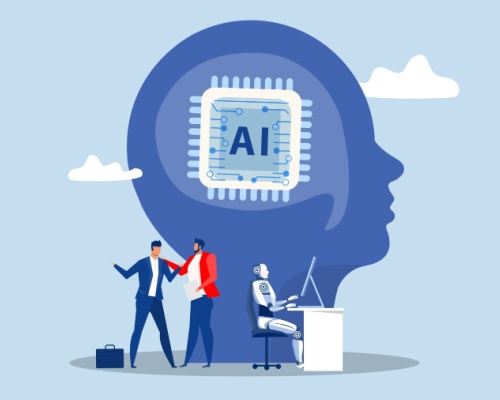Artificial Intelligence tools such as ChatGPT, Bing AI, and Google Gemini have exploded in popularity in recent years. More individuals are relying on AI to perform basic tasks and monotonous job duties, such as drafting correspondence, creating presentations, and conducting research. AI is a wonderful tool that can increase productivity and foster innovation in the workplace. However, it can also expose an organization to a breadth of business risks.
In this blog, we will discuss the power of AI and how to promote ethical and safe use in the workplace.
What are the Benefits and Risks of Using AI?
Services like ChatGPT are a type of AI called generative artificial intelligence. Generative artificial intelligence models are capable of producing various types of content, including text, images, and audio, in response to a written prompt by its user. Generative AI models can be used to reduce costs and promote efficiencies in the workplace by performing mundane tasks such as:
- Analyzing data;
- Conducting research;
- Drafting emails, cover letters, memoranda, and presentations;
- Responding to basic customer service inquiries; and
- Performing basic human resources and employee management functions.
However, AI is a developing technology and the efficacy of AI tools, including ChatGPT, is volatile. Using AI may lead to:
- Bias in employment decisions or other violations of employment laws;
- Infringement on another’s intellectual property or other IP violations;
- Breach of contract;
- Inadvertent use or disclosure of confidential, proprietary, or personal information (e.g., disclosure of protected health information subject to HIPAA rules);
- Creating and disseminating misinformation; or
- Errors and inaccuracies in work product.
How Can Your Organization Mitigate the Risks of Using AI?
It is important to acknowledge the risks inherent to using AI. To mitigate these risks, organizations should develop and adopt an Artificial Intelligence Usage Policy to help ensure that use of AI tools in the workplace is authorized, monitored, ethical, and compliant with applicable law. The policy should clearly state employees‘ authorized and prohibited uses of AI, impose ethical standards on employees’ use of AI for business purposes, and set forth guidelines for using AI in the course of the employees’ regular job duties.
A comprehensive Artificial Intelligence Usage Policy should include:
- Guidelines for Using AI Tools. The policy should clearly state specific workplace tasks that employees may conduct using AI tools as well as prohibited uses for illegal or offensive content, infringement of intellectual property, and interference with other employee’s job duties. The guidelines should also require employees carefully review and verify outputs to ensure accuracy and completeness.
- Mandating AI Training. If the organization has the resources, the policy should provide for mandatory training for all employees to ensure that they are informed about what AI tools are available for use, how to use the tools safely, and the benefits and risks of using them.
- Reporting Non-Compliance and Dealing with Violations. The organization should rely on its employees to observe and report on violations of the policy. The policy should also clearly state how violations will be handled. Retaliation for whistleblowing is prohibited in the workplace, so the policy should remind employees that they will not be disciplined or intimidated for reporting misconduct.
- Integration with Related Policies. The policy may overlap with the organization’s other existing policies, such as a Code of Ethics, Confidentiality Policy, Privacy Policy, and Intellectual Property Policy. The policy should work with, not against, these other policies to mitigate risks. It should remind employees about their duty to comply with all other policies and that nothing in the Artificial Intelligence Usage Policy restricts or limits existing policies.
Conclusion
Encouraging and welcoming the use of AI in the workplace offers significant benefits in terms of efficiency and worker productivity. However, it also presents several risks that cannot be overlooked. By proactively addressing these risks in a comprehensive Artificial Intelligence Usage Policy, organizations can harness the power of AI in the workplace in an ethical and safe manner.
______________
Kyler Mejia is an associate (bar admission pending) with Caritas Law Group, P.C. Kyler counsels nonprofit and socially responsible businesses on corporate, trademark, tax, and fundraising matters nationwide and advises donors concerning major gifts. To schedule a consultation, call 602-456-0071 or email us through our contact form.

